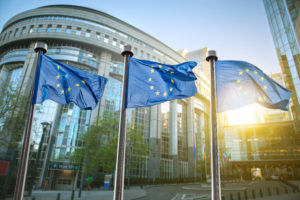Highlights from the Past Week
CW 12 / Monday, 21 to Thursday, 24 March: Mini Plenary Sessions Week (Brussels);
DIGITAL MARKETS ACT – COUNCIL AND PARLIAMENT REACH AGREEMENT: In the finish up, things went according to plan, meaning that the conclusion of the trilogue negotiations at the DMA could be announced last week.
Platforms with a market valuation of 75 billion Euro or a turnover in the European Economic Area of at least 7.5 billion Euro fall within the scope of the rules. Gatekeepers should also have 45 million monthly end users in the EU and 10,000 annual business users. The Parliament was successful in its request to have web browsers and virtual assistants be included in the scope of core platform services.
The new rules to be imposed on so-called gatekeeper platforms, derived from years of antitrust enforcement in the digital economy, include restrictions on combining personal data from different sources, an obligation to allow users to install apps from third-party platforms, a ban on bundling services, and a ban on self-preferencing practices.
The Parliament’s call for restrictions on targeted advertising to minors was rejected by EU negotiators, and partial agreement was reached on interoperability for messaging services. For group chats, there is a “phased regulation” over four years.
If a gatekeeper does not comply with the rules, the Commission can impose fines of up to 10 percent of the gatekeeper’s total worldwide turnover in the preceding financial year, and 20 percent in repeat cases. (see EP press release, Council press release, COM press release).
After being adopted last week, the rules still need to be signed off by the EU Council and Parliament. Deputy ambassadors are expected to confirm the agreement in the coming weeks, while the EU Parliament plans to present the text to the plenary either in July or September. The DMA is only applicable six months after it comes into force.
EU-US PRIVACY SHIELD – NEGOTIATIONS TO CONTINUE AFTER AGREEMENT: Commission President von der Leyen and U.S. President Biden last week signed a political agreement for future transatlantic data transfers (see Joint Statement). However, as of yet, not much has been disclosed about the details.
Nonetheless, a White House statement intimated what the structure (yet to be worked out) might look like. It said it would establish a “multi-level redress mechanism that includes an independent Data Protection Review Court”, to allow EU citizens to directly appeal against how their data was used by U.S. intelligence agencies. The same agencies would “adopt procedures to ensure effective oversight of new privacy and civil liberties standards”.
Much is now left to negotiators to work out in the finer details. According to media reports, this could happen as early as next month. But European data protection authorities and Member States would also still need to be involved for a final agreement. (see Politico Pro, paywall)
DIGITAL SERVICES ACT – COMMISSION WITH NEW PROPOSAL: The Commission proposes to require online search engines to remove notified content. This is according to its discussion paper (PDF), which was sent to DSA negotiators on 21 March.
This would create a new category of actors between caching services and hosting providers, requiring search engines to remove illegal content which they have been made aware of. In addition, they could be classified as very large online platforms.
Meanwhile, the French Council Presidency is trying to secure a new mandate from Member States for the negotiations (PDF1, PDF2; see Euractiv). The adoption of the revised mandate by the representatives of the states (COREPER I) is expected on 30 March. The next political trilogue is scheduled for 31 March.
In its proposal, France relaxes some obligations for marketplaces, but overall remains close to the general direction of the Council and the compromises already circulated during March. The mandate does not include Article 4, which could include search engines.
ARTIFICIAL INTELLIGENCE – EP GETS TO WORK: The joint report of the European Parliament’s Internal Market Committee (IMCO) and Civil Liberties Committee (LIBE) will be presented on 11 April. It will only contain those points agreed upon by the two negotiators, B. Benifei (S&D, Italy) and D. Tudorache (Renew, Romania). The rest of the text will be shaped by countless amendments from the various political parties, with the deadline for this set for 19 May. By 11 July, the co-advisory committees are to submit their opinions. Following this, in October, the MEPs are to discuss the report and also adopt it in the first November session of the plenary. This is how the plan is currently looking.
Meanwhile, the 18-month period of work in the AI Special Committee came to a close. (see EP press release)
CSAM – RENEWED POSTPONEMENT: The presentation of the new legislative proposal against child sexual abuse online, last announced for 30 March, has once again been postponed. Currently, 27 April is listed on the agenda of the EU Commission. Commissioner Johansson, however, spoke of May.
Contexte, meanwhile, has published the 15 February review of the Regulatory Scrutiny Board. In this review, the CSAM impact assessment received a green light with some “reservations”. The Board is the Commission’s advisory body tasked with monitoring the quality of proposals.
In its opinion (PDF), the Board noted that the draft had been substantially improved. Nevertheless, it asked the Directorate General (DG HOME) to rectify the report before launching the inter-service consultation, addressing the following points:
- EU Centre: more clarity required on the role and costs of the proposed EU Centre and how it will coordinate with Member States.
- Encryption: further clarification should be provided on how to avoid the risk of unintended privacy implications while ensuring legal certainty for obligated service providers.
- General monitoring: how can options that include an obligation to detect new child sexual abuse material or grooming comply with privacy requirements and the prohibition of general monitoring provisions?
- Scope: from which measures will SMEs not be exempted / how will they be supported?
EPRIVACY – NEXT ROUND OF TRILOGUE NEGOTIATIONS: Technical discussions are said to be “very slow” and the French Presidency is reported to have not yet presented a compromise text. Nevertheless, a negotiation date is scheduled for 31 March. (see Luca Bertuzzi via Twitter) A 4-column document dated for 18 March can be found here (PDF).
CYBERSECURITY – NEW RULES FOR EU INSTITUTIONS: The European Commission last week published its proposal to strengthen security in EU institutions, agencies, offices and bodies. Included is a proposal on information security that revises the way EU organisations share confidential information.
The biggest change concerns the EU’s Computer Emergency Response Team (CERT-EU), which will see its budget being increased to 14 million Euro and 11 new staff members added, bringing the total number of staff to 49.
CERT-EU will also be able to issue targeted guidance and recommendations to specific institutions and agencies and ask their IT services to share information about threats and incidents. Anticipate territorial disputes!
The EU is to establish an inter-institutional Cybersecurity Board that will drive and monitor the implementation of the regulation. It will include representatives from the EU institutions and key agencies.
EU institutions will be required to adopt multifactor authentication “as a norm”, as well as software supply chain security measures and zero-trust architecture assessment, which is a cyber policy method. (see Politico Pro, paywall)
DARK PATTERNS – EDPB PUBLISHES RECOMMENDATIONS: The European Data Protection Board (EDPB) has adopted recommendations on how to recognise and avoid “dark patterns” that violate the GDPR. Five use cases are proposed, from the opening of an account, to the management of consent, to its closure. EDPB also listed the different categories of deceptive interfaces. Comments can be submitted until 2 May.
ROAM LIKE AT HOME – EU PARLIAMENT CONFIRMS REGULATION: Last week, the European Parliament confirmed the trilogue’s outcome. The formal confirmation in the Council is still outstanding, with this required before the scheme enters into force. (see EP press release)
SPECIAL COMMITTEES IN THE EP – LIST OF MEMBERS: The European Parliament has published the list of members (PDF) for the new special committees (incl. INGE 2) (see EP press release).
COUNCIL PRESIDENCY – CHARLES MICHEL RE-ELECTED: Without any fanfare, Council President Michel was re-elected last week for a second term of two and a half years – from June 2022 to November 2024. (see Council press release)
FRANCE – PARENTAL ONLINE CONTROL: The French law on parental control is not being met with unanimity in Europe. While Next INpact (FR) reports that the European Commission’s opinion considers that the text is in line with the European strategy in this field, it said it was waiting for clarification of the technical details of the planned instruments and their compatibility with universal application, given the diversity of device manufacturers. It also warned against a possible transfer of responsibility to parents and recommended an external evaluation and the establishment of discussion groups.
Sweden is reportedly concerned about the barriers to trade that these rules could cause if they are not appropriate, necessary and proportionate to their purpose, and is seeking an impact assessment. Italy, on the other hand, has welcomed the text, which it sees as limiting the risk of compromising the moral and physical integrity of minors.
These comments date back to the first notification which was submitted in November 2021. After a revision, the text has already been notified a second time.
GERMANY – BNETZA SETS MINIMUM REQUIREMENTS FOR INTERNET: A so-called “right to a fast Internet” is to help consumers in Germany finally obtain improved – or, in some cases, any – network access from the summer onwards. To this end, the German Federal Network Agency (BNetzA) last week published a draft regulation (DE) that sets ten megabits per second in download as the minimum. Anyone who gets less can contact the BNetzA, which can then arrange for better lines to be laid. The minimum for uploads is to be 1.3 megabits per second.
Confirmation from the German federal government and the German Federal Council (Bundesrat) is still required for the regulation to come into force as planned on 1 June.
COPYRIGHT – A COPY IN THE CLOUD MAY BE A PRIVATE COPY: A copy of a copyrighted work stored in a cloud for private purposes may fall under the “private copy” exception. However, rightholders must receive fair compensation for this. This was decided by the ECJ last week in the Austro-Mechana case (C-433/20).
In principle, the exception for private copies with regard to reproductions on any medium can also apply to a copy made by a third party in a cloud, since EU law must be open to development with regard to technical innovations.
In this context, fair compensation is due to the rightholders. However, according to the ECJ, this levy is not necessarily owed by the provider of the cloud service, at least if other compensation is provided for by law. In this respect, there is a wide discretion conferred on the implementing Member State. (see ECJ press release, PDF)
Relevant Publications, including from the EP Think Tank:
- Digital Services Act & Digital Markets Act – Collection of studies for the IMCO committee (Briefing)
- Recasting of the EU Roaming Regulation (At a Glance)
- Strengthening Europol’s mandate (Briefing)
- What if machines made fairer decisions than humans? (At a Glance)
- Plenary round-up – March II 2022 (At a Glance)
- European Council Conclusions, 24-25 March
- NIS Cooperation Group’s Technical Guideline: Security Measures for Top-Level-Domain Name Registries
Outlook for the Coming Week
You can find a list of the upcoming dates of the European Parliament here. The meeting calendar for 2022 can be found here (PDF).
An overview of the most important dates of the Council week can be found here, the meeting calendar is accessible here, and the list of the main topics for the coming 14 days is available here, while an indicative calendar of meetings of the French Presidency Council can be found here (PDF).
Included among these dates are:
Summits and Ministerial Meetings:
- Extraoardinary Justice and Home Affairs Council, Monday, 28 March – Agenda, Background Brief;
- Employment, Social Policy, Health and Consumer Affairs Council (Health), Tuesday, 29 March – Agenda, A Items;
Preparatory Bodies:
- Working Party on Competition, Monday, 28 March and Thursday, 31 March;
- Working Party on Intellectual Property (Copyright) (incl. Data Act), Tuesday, 29 March;
- Working Party on Telecommunications and Information Society (incl. Data Act), Tuesday, 29 March and Thursday, 31 March;
- Working Party on Cooperation in Criminal Matters (COPEN), Wednesday, 30 March, Thursday, 31 March and Friday, 1 April;
- Horizontal Working Party on Cyber Issues (incl. NIS2, 5G), Wednesday, 29 March and Friday, 1 April;
- Working Party on Competitiveness and Growth (Internal Market) (incl. DSA), Friday, 1 April;
- Working Party on Tax Questions (Direct Taxation), Friday, 1 April;
- COREPER I (incl. DSA, ePrivacy), Wednesday, 30 March and Friday, 1 April;
- COREPER II, Wednesday, 30 March and Friday, 1 April;
Information about the weekly Commission meeting can be found in the preview (PDF) or (at short notice) in the current agenda. Topics of particular relevance include the legislative proposal against child abuse (lately rescheduled for either 27 April or the end of May) and the Media Freedom Act (29 June).
The following topics are on the agenda for the coming week:
- Circular economy package I
- Sustainable products policy initiative, including a revision of the Ecodesign Directive
- Review of the Construction Product Regulation
- Strategy on sustainable textiles
- Empowering consumers for the green transition
You can find the judicial calendar of the ECJ here. The ruling in Poland’s case on Article 17 of the DSM Directive is scheduled for 26 April (C-401/19).
European Parliament Committees
CW 13 / Monday, 28 to Thursday, 31 March: Political Group and Committee Meetings Week (Brussels);
LIBE Committee (EP)
Current Meetings
- Thursday, 31 March 2022, 9.00-12.00 (Brussels)
Excerpt from the Draft Agenda
From the perspective of the Internet industry, there are no topics of relevance on the current draft agenda.
Further Meetings (Calendar)
- Wednesday, 20 April 2022, 9.00-12.00 and 13.45-15.45 (Brussels)
- Thursday, 21 April 2022, 9.00-12.00 and 13.45-15.45 (Brussels)
JURI Committee (EP)
Current Meetings
- Monday, 28 March 2022, 13.45-16.15 and 16.45-18.45 (Brussels)
- Thursday, 31 March 2022
Excerpt from the Draft Agenda
28 March 2022, 13.45 – 14.45
…
- Harmonised rules on Artificial Intelligence (Artificial Intelligence Act) and amending certain Union Legislative Acts
JURI/9/05999
***I 2021/0106(COD) COM(2021)0206 – C9-0146/2021
| Rapporteur for the opinion: | |||
| Axel Voss (PPE) | PA – PE719.827v01-00 | ||
| Responsible: | |||
| IMCO, LIBE* | Brando Benifei (S&D) Dragoş Tudorache (Renew) |
||
- Second exchange of views
- Deadline for tabling amendments:23 March 2022, 12.00
28 March 2022, 16.45 – 17.45
…
- Exchange of views with Maroš Šefčovič, Vice-President of the European Commission for Interinstitutional Relations and Foresight
28 March 2022, 17.45 – 18.45
- Exchange of views with Věra Jourová, Vice-President of the European Commission for Values and Transparency
…
Further Meetings (Calendar)
- Monday, 25 April 2022 (Brussels)
- Thursday, 28 April 2022 (Brussels)
Dossiers Timetable (14 March 2022)
ITRE Committee (EP)
Current Meetings
- Thursday, 31 March 2022, 10.00-11.30 (Brussels)
Excerpt from the Draft Agenda
The current agenda was not available at the time of the mailing.
Further Meetings (Calendar)
- Wednesday, 20 April 2022
- Thursday, 21 April 2022
Dossiers Timetable (23 March 2022)
IMCO Committee (EP)
Current Meetings
- Monday, 28 March 2022, 45-15.45 and 16.45-18.45 (Brussels)
Excerpt from the Draft Agenda
28 March 2022, 13.45 – 15.45
Report on ongoing interinstitutional negotiations
- Contestable and fair markets in the digital sector (Digital Markets Act)
IMCO/9/04998
***I 2020/0374(COD) COM(2020)0842 – C9-0419/2020
| Rapporteur: | |||
| Andreas Schwab (PPE) | |||
| Responsible: | |||
| IMCO* | |||
- Reporting back to committee on the negotiations (Rule 74(3))
- Amending Directive 2014/53/EU on the harmonisation of the laws of the Member States relating to the making available on the market of radio equipment
IMCO/9/07216
***I 2021/0291(COD) COM(2021)0547 – C9-0366/2021
| Rapporteur: | |||
| Alex Agius Saliba (S&D) | PR – PE702.975v01-00 AM – PE704.875v01-00 |
||
| Responsible: | |||
| IMCO | |||
- Consideration of amendments and compromise amendments
…
- Establishing the 2030 Policy Programme “Path to the Digital Decade”
IMCO/9/07311
***I 2021/0293(COD) COM(2021)0574 – C9-0359/2021
| Rapporteur for the opinion: | |||
| Ivars Ijabs (Renew) | PA – PE704.564v01-00 AM – PE719.618v01-00 |
||
| Responsible: | |||
| ITRE | Martina Dlabajová (Renew) | PR – PE719.734v01-00 | |
- Consideration of amendments and compromise amendments
28 March 2022, 16.45 – 18.45
…
- State of play of the Single Market and its resilience in the light of the Russian aggression* Exchange of views
…
Further Meetings (Calendar)
- Wednesday, 20 April 2022 (Brussels)
- Thursday, 21 April 2022 (Brussels)
Dossiers Timetable (March 2022)
CULT Committee (EP)
Current Meetings
- None
Further Meetings (Calendar)
- Monday, 25April 2022 (Brussels)
Further Scheduled Parliamentary Calendar Dates
- CW 14 / Monday, 4 to Thursday, 7 April: Plenary Sessions Week (Strasbourg);
- CW 15 / Monday, 11 to Thursday, 14 April: Green Week (no meetings);
- CW 16 / Monday, 18 to Thursday, 21 April: Committee Meetings Week (Brussels);




